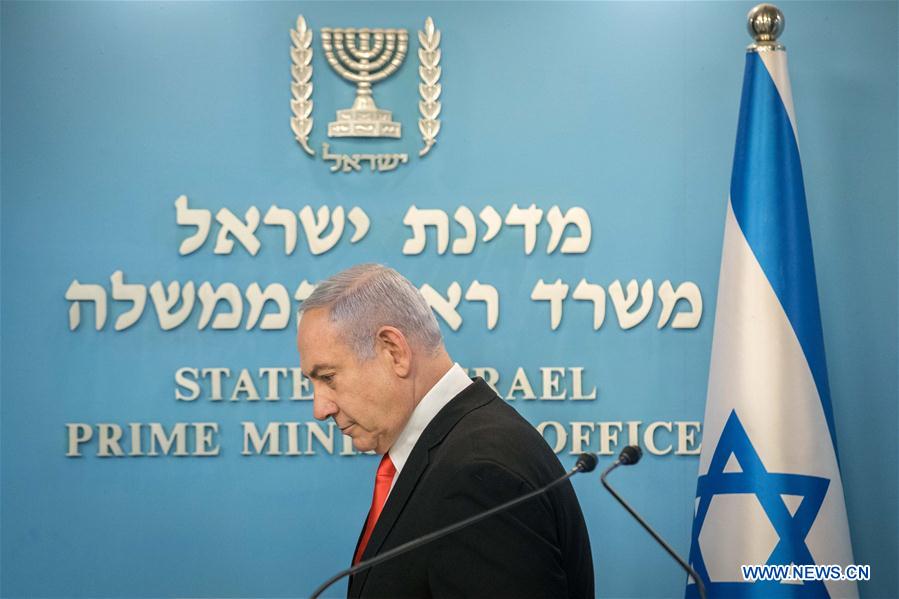
Israeli Prime Minister Benjamin Netanyahu addresses a press conference in Jerusalem, March 16, 2020. (Photo: Xinhua)
After three elections in less than 12 months, Israel finally seems to have a stable government in place. And just as it is trying to get over the hump of the coronavirus and pursue a peace plan.
It looked, for a time, like Israel have to face yet another election, as, once again, no party or coalition had a clear mandate following the March 2 election. Likud, the right-wing ruling party of current Prime Minister Benjamin Netanyahu narrowly beat out right-leaning candidate Benny Gantz's Blue and White Party – 29.5% to 26.6% of the total vote.
Gantz had actually won by an even-thinner margin in the previous election last September. However, that still left almost half of the 120 seats in the Knesset allocated to minor parties. In fact, a total of eight parties won six or more seats.
With its pure proportional system, Israel is a case study for political scientists. Many countries use mixed-proportional systems, but fewer use the pure version, and, of those, very few have such a low minimum electoral threshold for a party to enter parliament as Israel, where parties only need to win 3.25% of the vote in order to be allocated seats.
Germany, which uses a mixed system, has a minimum of 5%. The Republic of Korea (ROK), which held legislative elections on April 15, also has a unicameral legislature, but only 47 of its 300 seats are set aside for party-lists. The victorious Democratic Party easily won a majority this time without facing any necessity to form a coalition government.
The country whose electoral system is closest to Israel's is Denmark, where the minimum is even lower: 2%. This, too, has produced a confusingly-large number of parties in politics.
Therefore, Israeli prime ministers have to build coalitions with a diverse group of politicians scattered across the spectrum in all directions. That is what made it impossible for either of the two top vote-getting parties to cobble together a government the past two times.
Israeli parties are divided not only along left-right economic lines, but also along secular-religious lines, and, crucially, on the issue of policy towards the Palestinian territory. There are some Orthodox parties that hold social democratic views on economic, yet still support Netanyahu's right-wing coalition because they agree with its strong religious slant in politics and support expansion of Israeli settlements in the West Bank.
Seth Freedman, writing in The Guardian, observed: "Successive governments have paid dearly for forming coalitions with radical minority partners, especially when it comes to the perennial problems associated with the Palestinian conflict."
The difficulties of forming a government, combined with the grave domestic and geopolitical stakes, ultimately lead to Benny Gantz agreeing to form a unity government with Netanyahu. The latter stays on as prime minister for 18 more months, before Gantz takes over.
The main goals of this administration, according to a 14-page coalition agreement, will be solving the coronavirus epidemic and implementing the peace plan endorsed by U.S. President Trump. The first six months are supposed to feature an "emergency government" focusing primarily on the pandemic.
As difficult as it has been for governments around the world to halt the coronavirus, it might actually be easier than achieving territorial resolution and peace. Israel has had a relatively successful "track and trace" policy on COVID-19. It currently has 14,000 confirmed cases, not a huge amount in raw terms or proportional terms, but almost all of them have come since the second half of March.
Still, the territorial dispute over the West Bank and Gaza has been dragging on for decades, centuries even. Even the most enlightened diplomats have been unable to resolve it. Donald Trump's son-in-law, Jared Kushner, who presided over the process of writing a peace plan, is hardly the most enlightened of people, and not even a diplomat.
The U.S. wrote the plan without consulting a broad spectrum of Israeli society, and no Arab consultation whatsoever. The Palestinian leadership has already rejected it, ditto representatives of the Israeli settlers in the West Bank, who want its entirety to be annexed by Israel. Neighboring Arab states are not optimistic.
When it comes right down to it, the problem isn't Israel's electoral system or its coalition politics. It would be an intractable issue under any system.
Mitchell Blatt is a columnist with China.org.cn. For more information please visit:
http://www.china.org.cn/opinion/MitchellBlatt.htm
Opinion articles reflect the views of their authors, not necessarily those of China.org.cn.


